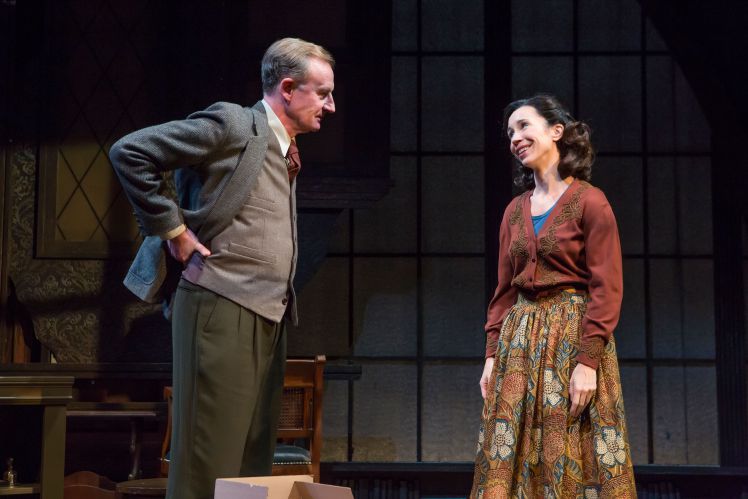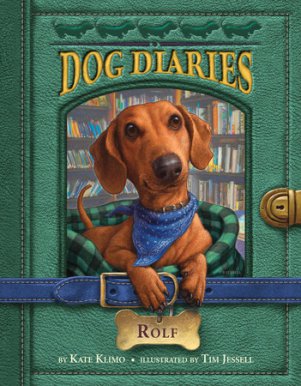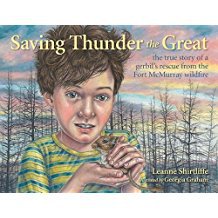
Daniel Gerroll, Robin Abramson. All photos by Jeremy Daniel.
Shadowlands: A Beautifully Stuffy Lecture on Love and Suffering.
By Ross
As a modern play, I would bet that
Shadowlands was considered quite a pleasant and harmless drama back in the day when it first debuted as a television film in 1985. Nothing all that challenging or disturbing, and I’m certain that it was viewed as a well crafted piece of storytelling when it made its stage debut at the Queen’s Theatre in London on 23rd of October, 1989, running for almost a year. The play, that won an Evening Standard Award for Best Play 1990 and a Tony award in 1991 for Best Actor (Nigel Hawthorne), centered around the real life story of an acclaimed British writer and his relationship with an American fan, whom he befriends and eventually marries. I do recall seeing the 1993 film, directed by Richard Attenborough starring Anthony Hopkins and Debra Winger (Oscar nominated), but beyond the pretty spot on casting, that’s about all I am able to remember. I knew it had something to do with the struggle with personal pain and grief that comes from a love relationship, but beyond that, I could only recall that it felt quite proper and charming, like a Merchant/Ivory film without the beautiful vistas.
The current production of William Nicholson’s well crafted play, as directed by Christa Scott-Reed (New World’s Church and State) champions the same solid qualities unabashingly. Brought to Theatre Row’s Acorn stage by the Fellowship for Performing Arts, this play tells the sweet and sad story of C. S. Lewis, (or Jack as his friends prefer to call him) portrayed exceedingly well by Daniel Gerroll (Broadway’s Plenty). We find him sitting comfortably in middle age, happily living the life of a quiet bachelor in Oxford, sharing a home with his loyal and steadfast brother, Major Warnie Lewis (John C. Vennema). He is perfectly content writing and lecturing his life away, until the day, when an American woman interjects herself into the conversation, and all else is in the history books.

Dan Kremer, Sean Gormley, Daryll Heysham, John C. Vennema. Photo by Jeremy Daniel.
We first are introduced to the famed author of the Narnia book series as he gives a lecture on God and the concept of suffering and patience. His life is void of romance, just the way he likes it, and without any of the pain that comes with love. It’s a beautiful real life set-up for what will slowly upend his safe and tranquil life, and it all starts with a request to meet from a bold American writer, Joy Davidman. She is wonderfully embodied by Robin Abramson (Philadelphia Theatre’s Tribes) briskly and confidently portraying the catalyst of change who storms the gates of the stuffy world of British male-dominated academia. She ruffles the feathers of most within his small circle, except for Lewis. For some reason, he is charmed by her, much to the surprise of his brother and Jack’s colleagues, who don’t quite understand her appeal, maybe just as much or more than Jack himself.
Regardless, their intellectual bond and mutual affection grow, slowly and steadily, taking Jack by surprise, right up to the end. She upends his intellectual constructs and fuels his emotional evolution. And only later, when he finds out what love and suffering truly mean, outside of a lecture, Jack is quite the changed man, at least emotionally. He may still be the stuffy British man who shies away from the sun, but he also forgoes self-preservation, forcing himself to rethink love, pain, and faith.
Joy is a breath of sharp fall air in the slightly dusty British halls of Jack’s existence. She is pushy and straightforward and manages to hold onto that part of her persona to the sad and bitter end. I didn’t quite believe in Joy’s pain or her infirmity near the end, but it also didn’t make her less likable. Davidman delivers on the required strength and passion that could melt the ice that surrounds Jack’s heart, and we understand how she is able to help make him a better man. I just wish we also saw some of her own weakness and struggle to a larger extent.

Daniel Gerroll, Robin Abramson. Photo by Jeremy Daniel.
On a very solid and somewhat overly fussy and noisy set, designed by Kelly James Tighe (Cherry Lane’s Nunsense), with lighting by Aaron Spivey (La Mama’s Jukebox Jackie), superbly stuffy period costuming by Michael Bevind (FOA’s The Screwtape Letters), and original music and sound design by John Gromada (Broadway’s The Trip to Bountiful), the historically balanced drama marches forward, sometimes a bit too slowly and properly, but all with very good taste indeed. The cast all do a fantastic stiff-upper-lipped job, especially Vennema (Broadway’s The Royal Family) as Jack’s solid and kind brother. His genuine empathetic soul is on full display throughout, but becomes more pronounced with his hand-holding of Joy’s young son, played sweetly and naturally by Jack McCarthy/Jacob Morrell.
It’s a heart warming moment in a heart warming play about the bravery of stepping into the arena of Love. Knowing full well that pain and suffering comes on the backside. Earlier on, Jack perches that one should endure suffering with patience, but his ideals no longer applied once Joy entered the picture. Jack dives in to the pool of Love and Pain, gracefully and quite properly, like any good solid Brit would do. And we applaud that brave step forward.

Robin Abramson, Daniel Gerroll. All photos by Jeremy Daniel.
Advertisements
Share this:
Like this:Like Loading...
 Daniel Gerroll, Robin Abramson. All photos by Jeremy Daniel.
Shadowlands: A Beautifully Stuffy Lecture on Love and Suffering.
By Ross
As a modern play, I would bet that Shadowlands was considered quite a pleasant and harmless drama back in the day when it first debuted as a television film in 1985. Nothing all that challenging or disturbing, and I’m certain that it was viewed as a well crafted piece of storytelling when it made its stage debut at the Queen’s Theatre in London on 23rd of October, 1989, running for almost a year. The play, that won an Evening Standard Award for Best Play 1990 and a Tony award in 1991 for Best Actor (Nigel Hawthorne), centered around the real life story of an acclaimed British writer and his relationship with an American fan, whom he befriends and eventually marries. I do recall seeing the 1993 film, directed by Richard Attenborough starring Anthony Hopkins and Debra Winger (Oscar nominated), but beyond the pretty spot on casting, that’s about all I am able to remember. I knew it had something to do with the struggle with personal pain and grief that comes from a love relationship, but beyond that, I could only recall that it felt quite proper and charming, like a Merchant/Ivory film without the beautiful vistas.
The current production of William Nicholson’s well crafted play, as directed by Christa Scott-Reed (New World’s Church and State) champions the same solid qualities unabashingly. Brought to Theatre Row’s Acorn stage by the Fellowship for Performing Arts, this play tells the sweet and sad story of C. S. Lewis, (or Jack as his friends prefer to call him) portrayed exceedingly well by Daniel Gerroll (Broadway’s Plenty). We find him sitting comfortably in middle age, happily living the life of a quiet bachelor in Oxford, sharing a home with his loyal and steadfast brother, Major Warnie Lewis (John C. Vennema). He is perfectly content writing and lecturing his life away, until the day, when an American woman interjects herself into the conversation, and all else is in the history books.
Daniel Gerroll, Robin Abramson. All photos by Jeremy Daniel.
Shadowlands: A Beautifully Stuffy Lecture on Love and Suffering.
By Ross
As a modern play, I would bet that Shadowlands was considered quite a pleasant and harmless drama back in the day when it first debuted as a television film in 1985. Nothing all that challenging or disturbing, and I’m certain that it was viewed as a well crafted piece of storytelling when it made its stage debut at the Queen’s Theatre in London on 23rd of October, 1989, running for almost a year. The play, that won an Evening Standard Award for Best Play 1990 and a Tony award in 1991 for Best Actor (Nigel Hawthorne), centered around the real life story of an acclaimed British writer and his relationship with an American fan, whom he befriends and eventually marries. I do recall seeing the 1993 film, directed by Richard Attenborough starring Anthony Hopkins and Debra Winger (Oscar nominated), but beyond the pretty spot on casting, that’s about all I am able to remember. I knew it had something to do with the struggle with personal pain and grief that comes from a love relationship, but beyond that, I could only recall that it felt quite proper and charming, like a Merchant/Ivory film without the beautiful vistas.
The current production of William Nicholson’s well crafted play, as directed by Christa Scott-Reed (New World’s Church and State) champions the same solid qualities unabashingly. Brought to Theatre Row’s Acorn stage by the Fellowship for Performing Arts, this play tells the sweet and sad story of C. S. Lewis, (or Jack as his friends prefer to call him) portrayed exceedingly well by Daniel Gerroll (Broadway’s Plenty). We find him sitting comfortably in middle age, happily living the life of a quiet bachelor in Oxford, sharing a home with his loyal and steadfast brother, Major Warnie Lewis (John C. Vennema). He is perfectly content writing and lecturing his life away, until the day, when an American woman interjects herself into the conversation, and all else is in the history books.
 Dan Kremer, Sean Gormley, Daryll Heysham, John C. Vennema. Photo by Jeremy Daniel.
We first are introduced to the famed author of the Narnia book series as he gives a lecture on God and the concept of suffering and patience. His life is void of romance, just the way he likes it, and without any of the pain that comes with love. It’s a beautiful real life set-up for what will slowly upend his safe and tranquil life, and it all starts with a request to meet from a bold American writer, Joy Davidman. She is wonderfully embodied by Robin Abramson (Philadelphia Theatre’s Tribes) briskly and confidently portraying the catalyst of change who storms the gates of the stuffy world of British male-dominated academia. She ruffles the feathers of most within his small circle, except for Lewis. For some reason, he is charmed by her, much to the surprise of his brother and Jack’s colleagues, who don’t quite understand her appeal, maybe just as much or more than Jack himself.
Regardless, their intellectual bond and mutual affection grow, slowly and steadily, taking Jack by surprise, right up to the end. She upends his intellectual constructs and fuels his emotional evolution. And only later, when he finds out what love and suffering truly mean, outside of a lecture, Jack is quite the changed man, at least emotionally. He may still be the stuffy British man who shies away from the sun, but he also forgoes self-preservation, forcing himself to rethink love, pain, and faith.
Joy is a breath of sharp fall air in the slightly dusty British halls of Jack’s existence. She is pushy and straightforward and manages to hold onto that part of her persona to the sad and bitter end. I didn’t quite believe in Joy’s pain or her infirmity near the end, but it also didn’t make her less likable. Davidman delivers on the required strength and passion that could melt the ice that surrounds Jack’s heart, and we understand how she is able to help make him a better man. I just wish we also saw some of her own weakness and struggle to a larger extent.
Dan Kremer, Sean Gormley, Daryll Heysham, John C. Vennema. Photo by Jeremy Daniel.
We first are introduced to the famed author of the Narnia book series as he gives a lecture on God and the concept of suffering and patience. His life is void of romance, just the way he likes it, and without any of the pain that comes with love. It’s a beautiful real life set-up for what will slowly upend his safe and tranquil life, and it all starts with a request to meet from a bold American writer, Joy Davidman. She is wonderfully embodied by Robin Abramson (Philadelphia Theatre’s Tribes) briskly and confidently portraying the catalyst of change who storms the gates of the stuffy world of British male-dominated academia. She ruffles the feathers of most within his small circle, except for Lewis. For some reason, he is charmed by her, much to the surprise of his brother and Jack’s colleagues, who don’t quite understand her appeal, maybe just as much or more than Jack himself.
Regardless, their intellectual bond and mutual affection grow, slowly and steadily, taking Jack by surprise, right up to the end. She upends his intellectual constructs and fuels his emotional evolution. And only later, when he finds out what love and suffering truly mean, outside of a lecture, Jack is quite the changed man, at least emotionally. He may still be the stuffy British man who shies away from the sun, but he also forgoes self-preservation, forcing himself to rethink love, pain, and faith.
Joy is a breath of sharp fall air in the slightly dusty British halls of Jack’s existence. She is pushy and straightforward and manages to hold onto that part of her persona to the sad and bitter end. I didn’t quite believe in Joy’s pain or her infirmity near the end, but it also didn’t make her less likable. Davidman delivers on the required strength and passion that could melt the ice that surrounds Jack’s heart, and we understand how she is able to help make him a better man. I just wish we also saw some of her own weakness and struggle to a larger extent.
 Daniel Gerroll, Robin Abramson. Photo by Jeremy Daniel.
On a very solid and somewhat overly fussy and noisy set, designed by Kelly James Tighe (Cherry Lane’s Nunsense), with lighting by Aaron Spivey (La Mama’s Jukebox Jackie), superbly stuffy period costuming by Michael Bevind (FOA’s The Screwtape Letters), and original music and sound design by John Gromada (Broadway’s The Trip to Bountiful), the historically balanced drama marches forward, sometimes a bit too slowly and properly, but all with very good taste indeed. The cast all do a fantastic stiff-upper-lipped job, especially Vennema (Broadway’s The Royal Family) as Jack’s solid and kind brother. His genuine empathetic soul is on full display throughout, but becomes more pronounced with his hand-holding of Joy’s young son, played sweetly and naturally by Jack McCarthy/Jacob Morrell.
It’s a heart warming moment in a heart warming play about the bravery of stepping into the arena of Love. Knowing full well that pain and suffering comes on the backside. Earlier on, Jack perches that one should endure suffering with patience, but his ideals no longer applied once Joy entered the picture. Jack dives in to the pool of Love and Pain, gracefully and quite properly, like any good solid Brit would do. And we applaud that brave step forward.
Daniel Gerroll, Robin Abramson. Photo by Jeremy Daniel.
On a very solid and somewhat overly fussy and noisy set, designed by Kelly James Tighe (Cherry Lane’s Nunsense), with lighting by Aaron Spivey (La Mama’s Jukebox Jackie), superbly stuffy period costuming by Michael Bevind (FOA’s The Screwtape Letters), and original music and sound design by John Gromada (Broadway’s The Trip to Bountiful), the historically balanced drama marches forward, sometimes a bit too slowly and properly, but all with very good taste indeed. The cast all do a fantastic stiff-upper-lipped job, especially Vennema (Broadway’s The Royal Family) as Jack’s solid and kind brother. His genuine empathetic soul is on full display throughout, but becomes more pronounced with his hand-holding of Joy’s young son, played sweetly and naturally by Jack McCarthy/Jacob Morrell.
It’s a heart warming moment in a heart warming play about the bravery of stepping into the arena of Love. Knowing full well that pain and suffering comes on the backside. Earlier on, Jack perches that one should endure suffering with patience, but his ideals no longer applied once Joy entered the picture. Jack dives in to the pool of Love and Pain, gracefully and quite properly, like any good solid Brit would do. And we applaud that brave step forward.
 Robin Abramson, Daniel Gerroll. All photos by Jeremy Daniel.
Advertisements
Share this:
Robin Abramson, Daniel Gerroll. All photos by Jeremy Daniel.
Advertisements
Share this:




